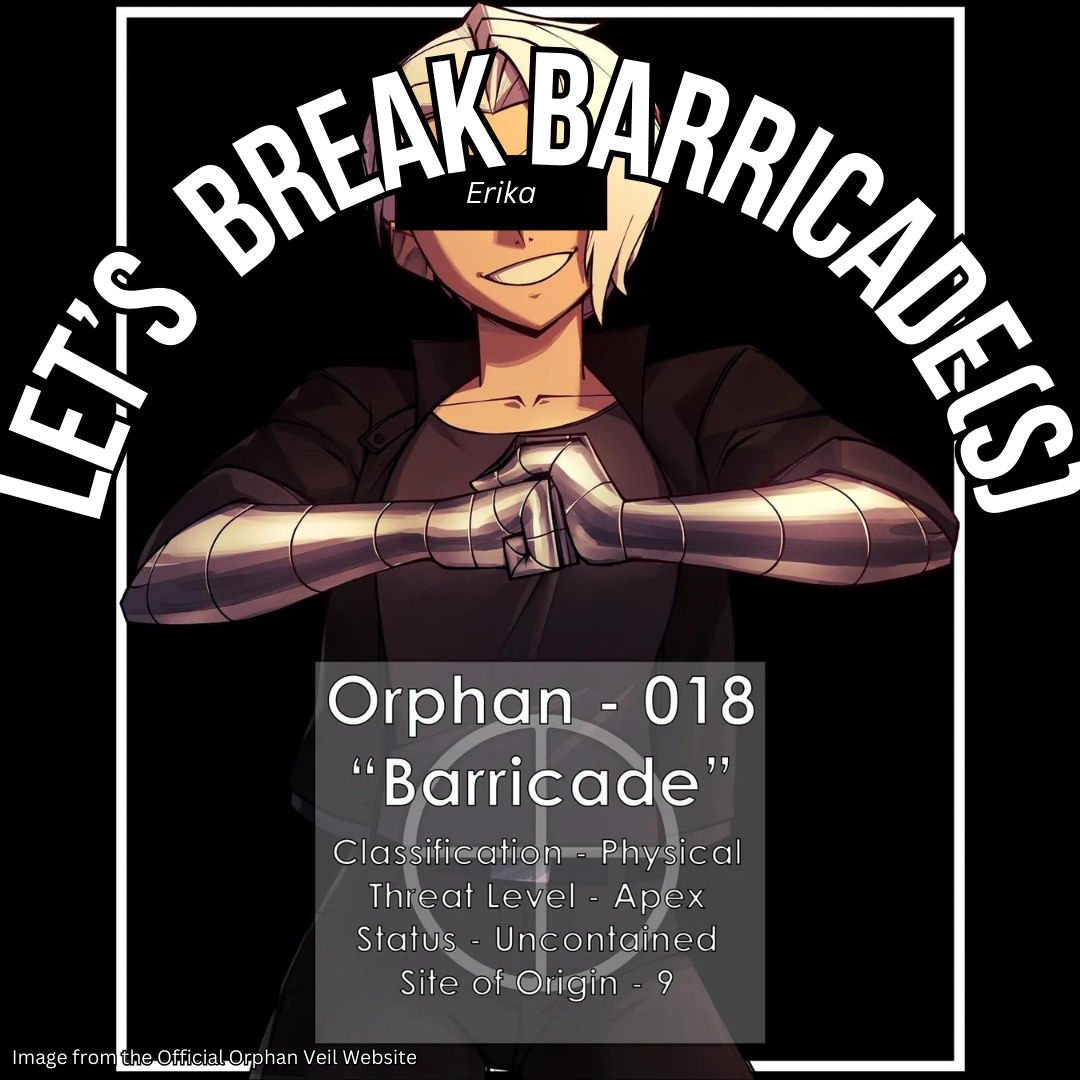By: Kai H Pettit
A couple of years back I found a YouTuber named FuchsiaButtter, or Lucy Annette Nitz, a transgender woman with a very unique, some could say crude, form of humor. I immediately fell in love with her content and found myself re-watching much of her content almost annually. Recently she released a book called Orphan Veil: The Stray on September 17, 2023, and I read through its almost 400 pages in two and a half weeks (an accomplishment for me). Although the story follows 4 teenage girls and 2 older, parent stand-ins, one character really stood out to me while reading, Barricade, or Barry for short, a brute who thinks with her fists first, and her head last.
What made Barry jump out to me is that she is a parallel for a transgender person without being trans herself and can open unexpected conversations and ideas to people who would have never known. During a confrontation between her and two other characters, she is referred to as Erika in the line “‘If you actually used that brain in your head, Erika,’ Bonnie snarled, unaware that she’d even deadnamed Barry” (199 Nitz). Erika is referenced as a “deadname,” a term commonly used when referring to the name a transgender person used before they transitioned. Later in the book, Bonnie confesses that she didn’t mean to use Barry’s deadname, stating “‘I was angry, and I was just trying to hurt you…. I thought of the worst thing I could say and I…’ Bonnie broke eye contact out of shame. ‘I’m sorry’” (225 Nitz). This represents yet another common occurrence with transgender people. Often using a transgender person’s deadname is a way of reminding them of everything they hate about themselves, and is one of if not the lowest of blows to use against another person. Although Barry may not be transgender herself, the terms and conditions surrounding her changing her name are very similar to those of many transgender people.
Now I’m not here to tell you that you should read this book, although you totally should, but instead, I’m here to make the argument that in Orphan Veil: The Stray, Barricade is a prime example of how to introduce people to transgender ideas and terms while avoiding any of the negative stereotypes and misconceptions surrounding the word “transgender” in this day and age. With the amount of anti-transgender bills growing, it comes as no surprise that there are many false assumptions made about transgender people, especially transgender youth, that are at best false, and at worst life-ending. The majority of these ideas stem from uneducation and ignorance that builds up on false information and can turn people away from changing their perspective in fear of being wrong. So how do we get past this seemingly unbreakable wall? One way is by sneaking around it with related topics and terms, which is precisely the implemented strategy in Orphan Veil: The Stray.
So what do I mean by ‘negative stereotypes and misconceptions’ exactly? Transgenderism is still seen by many as a mental disorder, although this is now medically disputed, many still circulate the idea that being trans is a ‘sickness’ that can and should be ‘cured.’ Another negative stereotype is that transgender people are confused or tricking others which implies that they are either dumb, malicious, or lying about being a different gender than that assigned at birth. Yet another common thought spread throughout society is that children are unable to understand if they are trans or not. Now this one is one of the most cited ideas for lawmaking in America with 117 out of 142 bills targeting specifically transgender youth between the ages 13-17. All these misconceptions lead to a societal barricade that prevents valuable conversation and change.
Barry serves as a way to push through these barricades that have been put in place to prevent change. She changed her name not because she was a ‘he,’ but because she wanted to distance herself from her mother in any way possible, which itself is a common phenomenon among transgender people who were cast out by family. Her deadname, Erika, was used to hurt her in a time of conflict, and the impact of that name holds just as strong as that of a transgender person’s deadname. Seeing these terms used outside the context of transgenderism can introduce people to these common terms while avoiding many of the previously mentioned misconceptions surrounding the word transgender. It gets the conversation started and gives a new entry point into the world of transgender people that avoids the word transgender, and before they know it, they have a vast and new perspective and understanding of the trans community that they otherwise would have never known or been introduced to.
Almost all of the characters in the Orphan Veil world stand to break societal norms and open more conversation about topics that many people would otherwise turn away from talking about. Ranging from the obvious lesbians, to the more subtle nodes to transgender people, and the obvious genetically altered Samantha and her metal tentacles to the classic happy-go-lucky farm girl Willow, every reader will find a character that introduces them to a modern struggle from a different and unexpected point of view, giving a new and refreshing perspective into real and pressing issues that many of us face every day. It’s because of stories, characters, and writers like these that change can begin, and so I ask one simple thing. Support creative people, watch their videos, shows, and movies, read their books, articles, and stories, encourage them to open more conversations, and break down barricades together.
